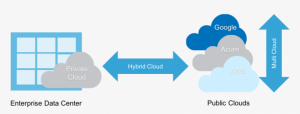Why Should Businesses Use Hybrid Cloud Computing Technologies – In the past, companies had to choose between two different types of cloud: off-premises public cloud or on-premises private cloud. Today, the cloud environment has become much more complex and the concept of hybrid cloud has emerged. Hybrid cloud, which is an excellent alternative to public and private cloud, is currently one of the most preferred cloud computing technologies by businesses.
According to the NTT 2021 Hybrid Cloud Report, 60.9% of businesses globally are already using (or piloting) hybrid cloud, and 32.7% of respondents plan to implement a hybrid solution within 1 to 2 years.

Why Should Businesses Use Hybrid Cloud Computing Technologies
What is Hybrid Cloud?
Hybrid cloud refers to a cloud environment that is a combination of on-premises private cloud and public cloud services. In a hybrid cloud, workloads can move between two interconnected environments. This gives your business the flexibility and agility it needs to deploy data.
Hybrid Cloud Infrastructure Architecture
Hybrid cloud infrastructure architecture consists of 3 main components:
The first requirement is general infrastructure as a service, such as AWS, Azure, or Google Cloud Drive.
The second requirement is a private cloud.
The third major requirement is the Wide Area Network (WAN), which is used to connect the two environments.
A successful hybrid cloud is created with the help of hypervisor and layers of cloud software. These implementations of software and services allow instances to switch between private and public cloud. With the help of services and software, advanced applications can be built on public and private platforms.
The hybrid cloud model allows businesses to deploy their workloads in private IT environments or public clouds and move between them as computing needs and costs change. This gives a business more flexibility and more data distribution options. A hybrid cloud workload includes the networking, hosting, and web service capabilities of an application.
There are important differences between hybrid and multicloud models, although the terms are sometimes used interchangeably. Hybrid cloud is available both on-premises from private sources as well as Microsoft, AWS and Google etc. Creates a single environment to run on public cloud resources offered by A multicloud environment consists of two or more public cloud providers, but does not require a dedicated or on-premises component.
1. Employee support (anywhere)
The hybrid cloud gives businesses the flexibility to support all employees (wherever they are) with on-demand access to data. Sensitive data can be kept on a private on-premises server, while all other data, services, and applications can be accessed via the public cloud.
2. Advanced security and risk management
One of the benefits of hybrid cloud computing is that it gives businesses more control over their critical and sensitive data. This allows the business to choose which data should be hosted in a private cloud based on compliance and security requirements. Data stored in a public cloud can be more vulnerable to cyber attacks and various forms of data leakage, so businesses often prefer to keep control of their proprietary data in a private cloud.
Strong technical security measures such as encryption and access control are used to secure the hybrid cloud. Also; Comprehensive encryption methods are also used to encrypt any data transferred from private cloud to public cloud for analytics, applications and other processes.
3. Reduced costs
Cost is always a key factor for a business, and hybrid cloud offers certain cost benefits.
The hybrid cloud is an effective solution for companies that need stringent data security and want to cost-effectively scale their operations. Basically, business critical and sensitive data can be stored in the private cloud, but less sensitive data and applications can reside in the public cloud.
Businesses that only use a private cloud have to incur a large capital outlay when they need to expand their infrastructure. However, companies can also take advantage of the public cloud component and keep costs low while expanding infrastructure in the public cloud with cost-effective scaling.
 Free VPS
Free VPS
